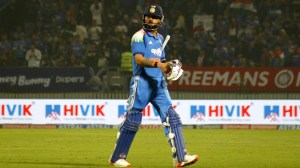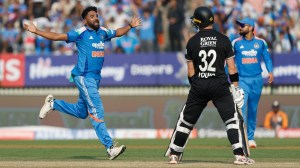Pvt practice bait for govt docs
MUMBAI, April 28: Doctors serving in Maharashtra's government hospitals will soon be able to earn a private income with the government on th...

MUMBAI, April 28: Doctors serving in Maharashtra8217;s government hospitals will soon be able to earn a private income with the government on the verge of finalising a draft giving this long-pending demand the green-signal.
The proposal is meant to deter doctors from quitting government service for more lucrative private practice while attracting more medical graduates to work in government-run hospitals. It will not be applicable to hospitals administered by civic corporations.
The doctors8217; crunch has afflicted government hospitals for several years with stringent working conditions and poor pay packets being a strong disincentive. But the government now hopes to remedy this. The draft, in its final stages, however stipulates certain pre-conditions to ensure that the bait doesn8217;t lure doctors away from their primary commitment. Barring them from setting up nursing homes, it does however allow doctors to serve as private consultants in hospitals. However, it underscores, they will have to be present in theirrespective hospitals when slotted for emergency duty.Moreover, the eligibility criteria also stipulates a minimum 10 years8217; service including three years8217; mandatory service in rural government hospitals. quot;The final draft, likely to be ready in three weeks, will be presented before the Cabinet for approval,quot; Minister for Health, Dr Daulatrao Aher, told Express Newsline.
The 11 government medical colleges in the state are categorised thus: those located in urban areas like Mumbai, Nagpur, Solapur, Pune and Aurangabad and hospital-cum-medical colleges in rural areas like Dhule, Nanded, Yavatmal, Miraj and Ambejogai. In the latter category, the eligibility criterion has been relaxed to seven years. The proposal has been hanging fire for over a year though there has been no dearth of negotiations between the government and the Maharashtra State Medical Teachers8217; Association MSMTA.
The association had also sent a letter to the Health Department apprising it of the problems faced by medical colleges,including rampant vacancies in full-time posts and the growing trend of doctors quitting service. This, the MSMTA says, is largely due to poor remuneration.
In Mumbai, there are 347 sanctioned posts for medical academic staff in 31 departments in government-run hospitals, of which only 170 are occupied by full-time staff appointed by the Maharashtra Public Service Commission. These hospitals 8211; Sir JJ Hospital, St George, GT and Cama amp; Albless 8211; together accommodate 2,800 beds.
On an average, sources reveal, the post of professors registers a 20 per cent vacancy; associate professors 40 per cent; and lecturers over 50 per cent.
Even the post of director, medical education, has been vacant for the last 10 years and has survived with doctors holding additional charge.
Further, the spate of personnel opting for voluntary retirement in the last two months has made the numbers dwindle considerably. For instance, on March 31, professor and head of department, Paediatric Surgery, at JJ Hospital, Dr JyotsnaKirtane, took voluntary retirement after 20 years of service to join Bombay Hospital. An associate professor in the Pathology Department also quit after serving 20 years with JJ Hospital to enrol as a professor with the Thane Municipal Corporation-run Rajiv Gandhi Medical College amp; Hospital.
Yet another associate professor with the Preventive amp; Social Medicine Department left to join the Mahatma Gandhi Medical College at Navi Mumbai.
Doctors have been agitating to bring pay scales on par with those of central government medical teachers or at least to the level recommended by the Medical Council of India. Moreover, promotions are few and far between, with doctors stagnating for as many as 10 to 15 years. The Radiology Department at JJ Hospital, which has 17 sanctioned posts, including two for professors, seven for associate professors and eight for lecturers, has only one full-time lecturer since the last five years. Though the lone lecturer has held the post for the last nine years, he has not beenpromoted.
But doctors in Mumbai are keeping their fingers crossed. They will breathe easy only once the government resolution notifying the proposal is issued. Similar assurances in the past have belied hopes and the doctors do not want to swallow another bitter pill. The Fifth Pay Commission has recommended that 25 per cent of basic pay be given as non-practice allowance NPA, hiking the present NPA of Rs 900 per month to Rs 3,000-Rs 4,000 per month. Doctors say if they are allowed to dip into private practice, the NPA may be scrapped altogether.
- 01
- 02
- 03
- 04
- 05































